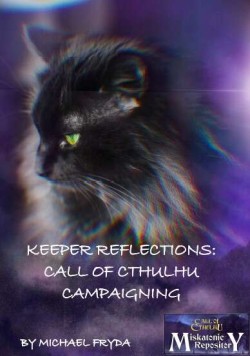Keeper Reflections: Call of Cthulhu Campaigning
 |
Highly-lethal¸ one-shot Call of Cthulhu is beloved for many reasons. While advice for running individual scenarios or short campaigns is widely available¸ many groups wonder how to run Call of Cthulhu in a longer framework.
These five short essays focus on insights¸ successes¸ and challenges from running a Call of Cthulhu campaign of 55 sessions (and counting). We run a narrative-focused game and have retired only a single investigator¸ by player choice. My hope is that any Keeper can find examples of choices made by both myself and my players that could be adopted or adapted to help any campaign engage in longer narratives with even more investigator development.
Many of the concepts discussed within could be very useful for any table-top role-playing game. The insights described within use Call of Cthulhu examples¸ but the methods could apply to and improve any lengthy campaign of any game.
The components include:
-An author's note summarizing our group philosophy and our goals for story focus.
-A discussion of a small but significant action we took to ensure safety at our table.
-Detailed examples of actions I took as Keeper to ensure player agency guided the narrative¸ but still made preparation manageable and lower stress.
-Comprehensive descriptions of the circumstances that lead to the development and use of primary campaign NPCs and antagonists. Included in this section is an example of how I altered the classic Necronomicon to craft more role-playing and cosmic horror opportunities.
-How I build and manage a long-term network of interconnecting plot¸ location¸ and character elements¸ including published scenario¸ encounter and home brew elements.
-The complete pathway of how I helped one of my players engage with a crafting project of weird tech that has been modified for over 50 game sessions. Including a new spell¸ a strange Mythos artifact¸ and ideas on how to use the framework for any scientific or artistic medium.
-A FAQ section with commonly asked questions of how to handle aspects of longer campaign play and how to support the needs of community members whose perspectives and needs may differ from a Keeper's prior experiences.
You also get:
-Eleven excerpts of my hand-written campaign journal that show my planning process¸ how I keep track of complex relationships¸ how I script critical NPC conversations¸ and evidence of the importance of letting go of ideas that players do not choose.
-A separate document that includes larger versions of these photos for those that prefer larger text.
-An image of our campaign emblem that we had printed in sticker form as a memorable keepsake.
*Disclaimers: This product contains minor spoilers/discussion of many other Call of Cthulhu scenarios. This product was written for gamers willing to consider how thoughtful language choice can make for a more inclusive hobby with safer¸ more welcoming tables.
Highly-lethal¸ one-shot Call of Cthulhu is beloved for many reasons. While advice for running individual scenarios or short campaigns is widely available¸ many groups wonder how to run Call of Cthulhu in a longer framework.
These five short essays focus on insights¸ successes¸ and challenges from running a Call of Cthulhu campaign of 55 sessions (and counting). We run a narrative-focused game and have retired only a single investigator¸ by player choice. My hope is that any Keeper can find examples of choices made by both myself and my players that could be adopted or adapted to help any campaign engage in longer narratives with even more investigator development.
Many of the concepts discussed within could be very useful for any table-top role-playing game. The insights described within use Call of Cthulhu examples¸ but the methods could apply to and improve any lengthy campaign of any game.
The components include:
-An author's note summarizing our group philosophy and our goals for story focus.
-A discussion of a small but significant action we took to ensure safety at our table.
-Detailed examples of actions I took as Keeper to ensure player agency guided the narrative¸ but still made preparation manageable and lower stress.
-Comprehensive descriptions of the circumstances that lead to the development and use of primary campaign NPCs and antagonists. Included in this section is an example of how I altered the classic Necronomicon to craft more role-playing and cosmic horror opportunities.
-How I build and manage a long-term network of interconnecting plot¸ location¸ and character elements¸ including published scenario¸ encounter and home brew elements.
-The complete pathway of how I helped one of my players engage with a crafting project of weird tech that has been modified for over 50 game sessions. Including a new spell¸ a strange Mythos artifact¸ and ideas on how to use the framework for any scientific or artistic medium.
-A FAQ section with commonly asked questions of how to handle aspects of longer campaign play and how to support the needs of community members whose perspectives and needs may differ from a Keeper's prior experiences.
You also get:
-Eleven excerpts of my hand-written campaign journal that show my planning process¸ how I keep track of complex relationships¸ how I script critical NPC conversations¸ and evidence of the importance of letting go of ideas that players do not choose.
-A separate document that includes larger versions of these photos for those that prefer larger text.
-An image of our campaign emblem that we had printed in sticker form as a memorable keepsake.
*Disclaimers: This product contains minor spoilers/discussion of many other Call of Cthulhu scenarios. This product was written for gamers willing to consider how thoughtful language choice can make for a more inclusive hobby with safer¸ more welcoming tables.